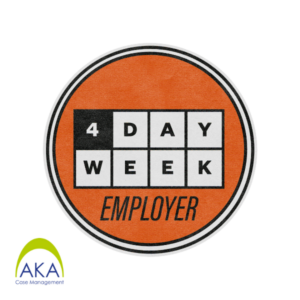
Embracing the Future of Work: AKA’s 4-Day Work Week
In January 2022, AKA Case Management took a bold step to improve the work-life balance and well-being of its employees by taking part in the first-ever UK trial of a four-day working week. Whilst AKA received a lot of help and support from 4 Day Week Global, which ran the trial, they also spent a lot of time planning and introducing the concept, along with supporting their teams and staff in adjusting to this new way of working.
AKA has recently become accredited by the 4 Day Week Campaign as a Gold Standard employer, meaning staff now work 80% of their original hours (typically 32 hours over four days rather than 40 hours over five days) with no loss of pay. As they also celebrate the 2-year anniversary since the initial trial began in June 2022, AKA reflects on this journey and the results of moving to a 4-day week.
As part of the trial, data from 2021 was used to assess the effects of the 4-day week during 2022, and some of those results will be discussed in this piece.
Company Metrics
Whilst growth and productivity were never the goal, as with any business, AKA needed to ensure that they continued to be a sustainable service whilst moving to a 4-day working week.
As a Case Management company, the main way of assessing this was to compare Case Management hours. During this period, no significant change was seen in these figures, and, more importantly, the following results highlighted that this move was about far more than company statistics and something AKA wanted to continue doing for their staff, clients and external partners. One significant area of focus for AKA was ensuring that their clients and those they work closely with continued to receive an excellent service. Close business associates and all clients were asked to complete a survey before and after the trial to check that moving to a 4-day week did not affect their perception of AKA in terms of the company’s values and how they work. The table below shows the Net Promotor Scores before and after the trial, and it is confirmed that AKA was actually doing things better in their eyes.

The Employee Experience
What makes the above results even more impressive is that, on average, AKA employees’ weekly working hours dropped from 40.5 to 30.4 hours per week – a reduction in just over 10 hours per week. AKA believe this, along with the improved NPS scores, is a testament to great teamwork amongst the staff, but also shows what can be achieved through focusing on a happier and more refreshed workforce.
Interestingly, and probably due to a result of changes to working patterns after the Covid pandemic, the trial did not significantly alter the remote work dynamics. The frequency of remote work remained consistent for AKA, with scores around 1.5 on a scale where 0 represents never working remotely and 2 signifies fully remote work. This consistency suggests that the 4-day work week can be effectively integrated with existing remote work practices, offering flexibility without disruption.
As mentioned, the main purpose of trialling a 4-day week for AKA was for staff wellbeing and work-life balance. AKA conducted a survey for staff before and after the trial and received the following results which prove the impact it had on the wellbeing of the team*. These were the most significant results that showed that the 4-day week was something AKA wanted to continue with at all costs:
*All these results were statistically significant.
What our team told us
AKA asked the team to put into words their experiences of moving from working five days to four days and here are some examples of what they said:
Conclusion: A Promising Path Forward
Trialling and implementing the 4-day week is without doubt the boldest move AKA have made as a business. They are, quite rightly, hugely proud of taking this step in an industry that largely promotes working longer and harder over wellbeing.
Whilst it did take a lot of work leading up to the trial, as well as supporting each other to adjust during the trial, the amazing results from the NPS surveys and the feedback from their own staff vastly outweigh any other data and confirmed their commitment to continuing with the 4-day working week.
AKA remains successful and highly regarded as a Case Management company. They always say their staff are like an AKA family and, with the added benefit of working a 4-day week, this has clearly impacted not only the health and wellbeing of them in a positive way, but has also shown to improve the service they deliver to their close external partners, and to the people that matter most to them, the clients that they support.
*If anyone would like to discuss our experience of moving to a 4 day week further, please feel free to contact by email info@akacasemanagement.co.uk or fill in the Contact Us Form.